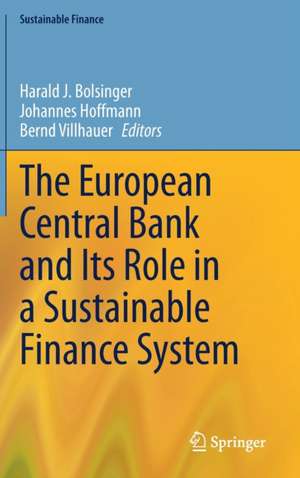The European Central Bank and Its Role in a Sustainable Finance System: Sustainable Finance
Editat de Harald J. Bolsinger, Johannes Hoffmann, Bernd Villhaueren Limba Engleză Hardback – 21 apr 2023
The volume includes contributions from academics and practitioners from the financial sector, civil society and institutions involved at European level.
Preț: 875.94 lei
Preț vechi: 1094.93 lei
-20% Nou
Puncte Express: 1314
Preț estimativ în valută:
167.64€ • 174.13$ • 139.25£
167.64€ • 174.13$ • 139.25£
Carte disponibilă
Livrare economică 13-27 ianuarie 25
Livrare express 27 decembrie 24 - 02 ianuarie 25 pentru 27.41 lei
Preluare comenzi: 021 569.72.76
Specificații
ISBN-13: 9783031244773
ISBN-10: 303124477X
Pagini: 128
Ilustrații: XI, 128 p. 2 illus.
Dimensiuni: 155 x 235 x 16 mm
Greutate: 0.38 kg
Ediția:2023
Editura: Springer International Publishing
Colecția Springer
Seria Sustainable Finance
Locul publicării:Cham, Switzerland
ISBN-10: 303124477X
Pagini: 128
Ilustrații: XI, 128 p. 2 illus.
Dimensiuni: 155 x 235 x 16 mm
Greutate: 0.38 kg
Ediția:2023
Editura: Springer International Publishing
Colecția Springer
Seria Sustainable Finance
Locul publicării:Cham, Switzerland
Cuprins
Chapter 1. From Climate Finance to “climate Finance Society” to a Culture of Sus-tainability. Changing Perspectives on the ECB’s New Strategy.- Chapter 2. Sustainable Finance: What has Happened – What Needs to Happen?.- Chapter 3. The New Sustainability Strategy of the ECB.- Chapter 4. Independently Green? An Integrated Strategy for a Transformative ECB.- Chapter 5. Credibility in the Financial Market – a Practical Perspective.- Chapter 6. Fundamental Rights in the Core Business of the ECB – Still No Issue.- Chapter 7. The Club of Rome, the Global Perspective.- Chapter 8. What to Do with Modern Money Theory (MMT)?.- Chapter 9. The Role of the EU Taxonomy.
Notă biografică
Harald J. Bolsinger is former Dean and Vice-Dean of the Faculty of Economics and Business Administration at the Technical University of Applied Sciences Würzburg-Schweinfurt (THWS), Germany. He gained extensive practical experience in corporate customer care and sales in the cooperative banking sector, as an economic promoter for the city of Nuremberg, Germany, and in independent management consultancy. He is active in numerous initiatives to promote sustainable corporate governance, corporate responsibility, and Christian values in business and academic life. He has taught at various universities, and his current focus is chiefly on sustainable corporate management and values management, as well as business ethics issues. He served in the Research Group Finance and Economy of the Weltethos Institute at the University of Tübingen as Director Regulatory Policy (Member of the Board) until 01/2023.
Johannes Hofmann was in charge of developing the Frankfurt-Hohenheimer catalogue, providing the most comprehensive criteria for ethical investments with over 800 evaluation criteria the basis for assigning sustainability ratings to many companies worldwide. He is Chairman of the Founding Board of the Research Group Finance and Economy of the Weltethos Institute at the University of Tübingen.
Bernd Villhauer is Managing Director of the Global Ethic Institute (WEIT) at the University of Tübingen, Germany, and has taught at the Universities of Karlsruhe, Jena, Darmstadt and Tübingen. His main research interests are in cultural and media science issues, as well as theoretical and practical philosophy and economics. He is the co-founder of the Institute for Philosophy of Practice in Darmstadt, Germany and Director of the Good Governance Lab at the European School of Governance (EUSG). In the Research Group Finance and Economy of the Weltethos Institute at the University of Tübingen he is Member of the Board (Director Research Organization).
Johannes Hofmann was in charge of developing the Frankfurt-Hohenheimer catalogue, providing the most comprehensive criteria for ethical investments with over 800 evaluation criteria the basis for assigning sustainability ratings to many companies worldwide. He is Chairman of the Founding Board of the Research Group Finance and Economy of the Weltethos Institute at the University of Tübingen.
Bernd Villhauer is Managing Director of the Global Ethic Institute (WEIT) at the University of Tübingen, Germany, and has taught at the Universities of Karlsruhe, Jena, Darmstadt and Tübingen. His main research interests are in cultural and media science issues, as well as theoretical and practical philosophy and economics. He is the co-founder of the Institute for Philosophy of Practice in Darmstadt, Germany and Director of the Good Governance Lab at the European School of Governance (EUSG). In the Research Group Finance and Economy of the Weltethos Institute at the University of Tübingen he is Member of the Board (Director Research Organization).
Textul de pe ultima copertă
This book analyses the new strategic decisions of the European Central Bank. Contributors from different fields examine especially the sustainability strategy of the ECB: What role can the European Central Bank play in fighting climate change? ECB President Christine Lagarde has repeatedly confirmed that the central bank wants to play a role in coping with climate change. What will this role be? What instruments does the ECB have to make a difference in challenges such as the defossilization of the economy and transport, biodiversity, the energy transition, resource consumption and other sustainability areas? Is it entitled or obliged to go beyond the classic mandate of maintaining price stability?
The volume includes contributions from academics and practitioners from the financial sector, civil society and institutions involved at European level.
The volume includes contributions from academics and practitioners from the financial sector, civil society and institutions involved at European level.
Caracteristici
Describes new approaches to sustainable finance by the ECB Analyses the impact of ECB decisions on climate change Offers an interdisciplinary approach to the topic














